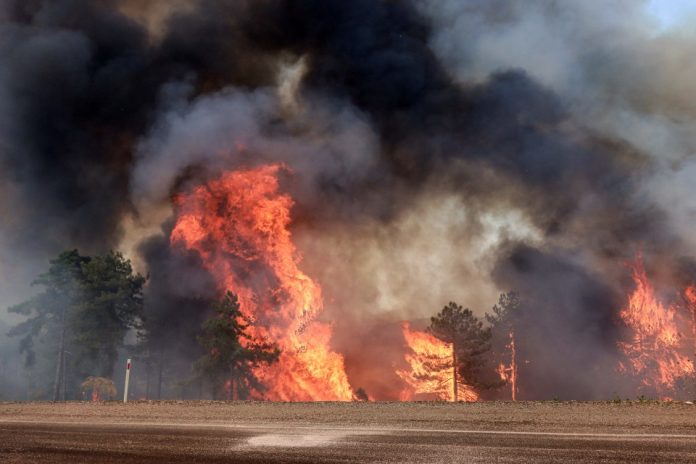Amidst the second week of extreme heat affecting much of the Mediterranean, fire services in Turkey and Bulgaria continue to battle large-scale forest fires. High temperatures, fuelled by strong winds, are creating conditions for the rapid spread of fire and hampering efforts to extinguish the blazes.
Turkey battles wildfires
In Turkey, according to local authorities, at least 14 people have died in fires over the past week. About 20 villages have been evacuated. In the south-east of the country, in the city of Diyarbakır, temperatures reached 45.4°C on Monday. According to local authorities, the abnormal weather conditions will continue until at least August 2. On Friday, a record temperature of 50.5°C was recorded in Silopi, located two hours’ drive from Diyarbakir.
In the Bursa region, Turkey’s fourth largest city, fires have been burning for three days. Wind gusts are helping to spread the fires, and local residents are joining the efforts to extinguish them with all available means: some are delivering water on tractors, others are bringing bottles of water.
Minister of Agriculture and Forestry Ibrahim Yumakli acknowledged that, given the scale and conditions, the state may not have sufficient resources to respond quickly. According to him, strong winds make aerial firefighting impossible, and it takes hours or even days to stabilise the situation.
According to Turkish authorities, the risk of new fires will remain until October.
Bulgaria combats blazes amid heatwave, strong winds
In Bulgaria, according to rescue services, more than 160 fires were burning simultaneously on Monday.
In the village of Rani Lug, located on the border with Serbia, a fire destroyed about 20 houses. Bulgaria asked the EU for help in extinguishing the fires, and two Swedish aircraft, as well as helicopters and crews from Slovenia, the Czech Republic, Hungary, France and Romania, took part in the operation.
Greece faces unprecedented heatwave
Greece, where forest fires caused mass evacuations during the summer, had brought most of the fires under control by the beginning of the week. However, on Monday, a new fire broke out on a university campus in the Zografou area, east of Athens. Sixty-five firefighters, 20 ground vehicles, seven helicopters and six aircraft were called in to extinguish the blaze. Temperatures in the region remain above 40°C.
On the Iberian Peninsula, four aircraft from Spain joined Portuguese firefighters in the Viana do Castelo area, where the fire spread in mountainous terrain.
Portugal’s civil defence chief, Marco Dominguez, noted that the wind direction is complicating the firefighting efforts, causing the flames to move in two directions at once. The country’s authorities have declared the highest level of fire danger in most of the northern and southern regions.
